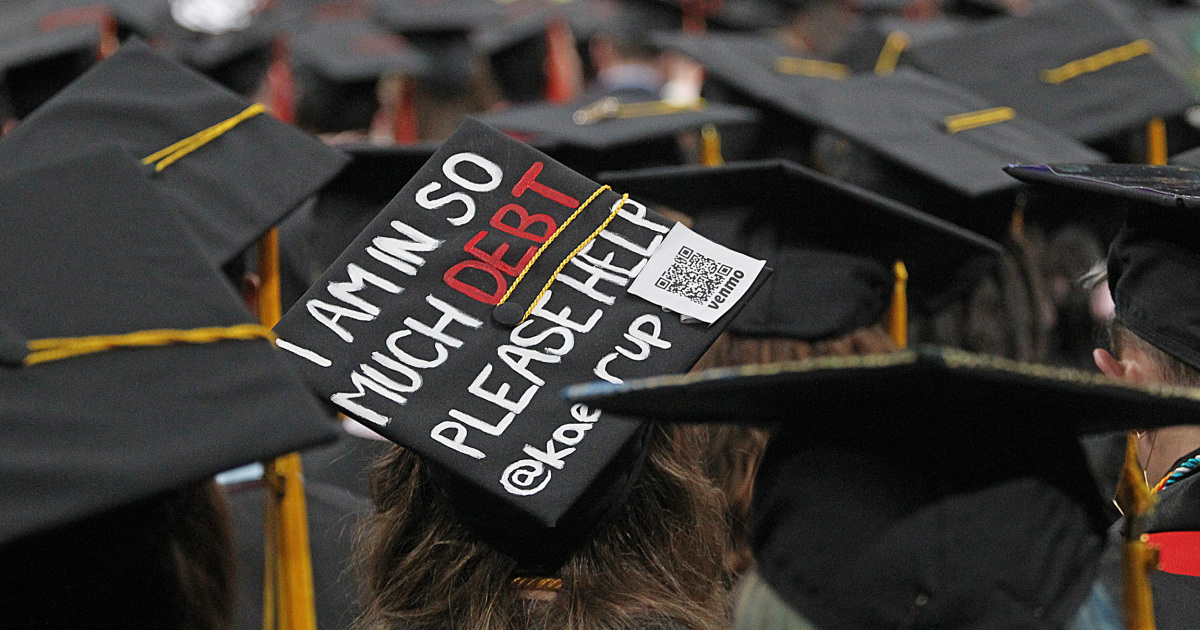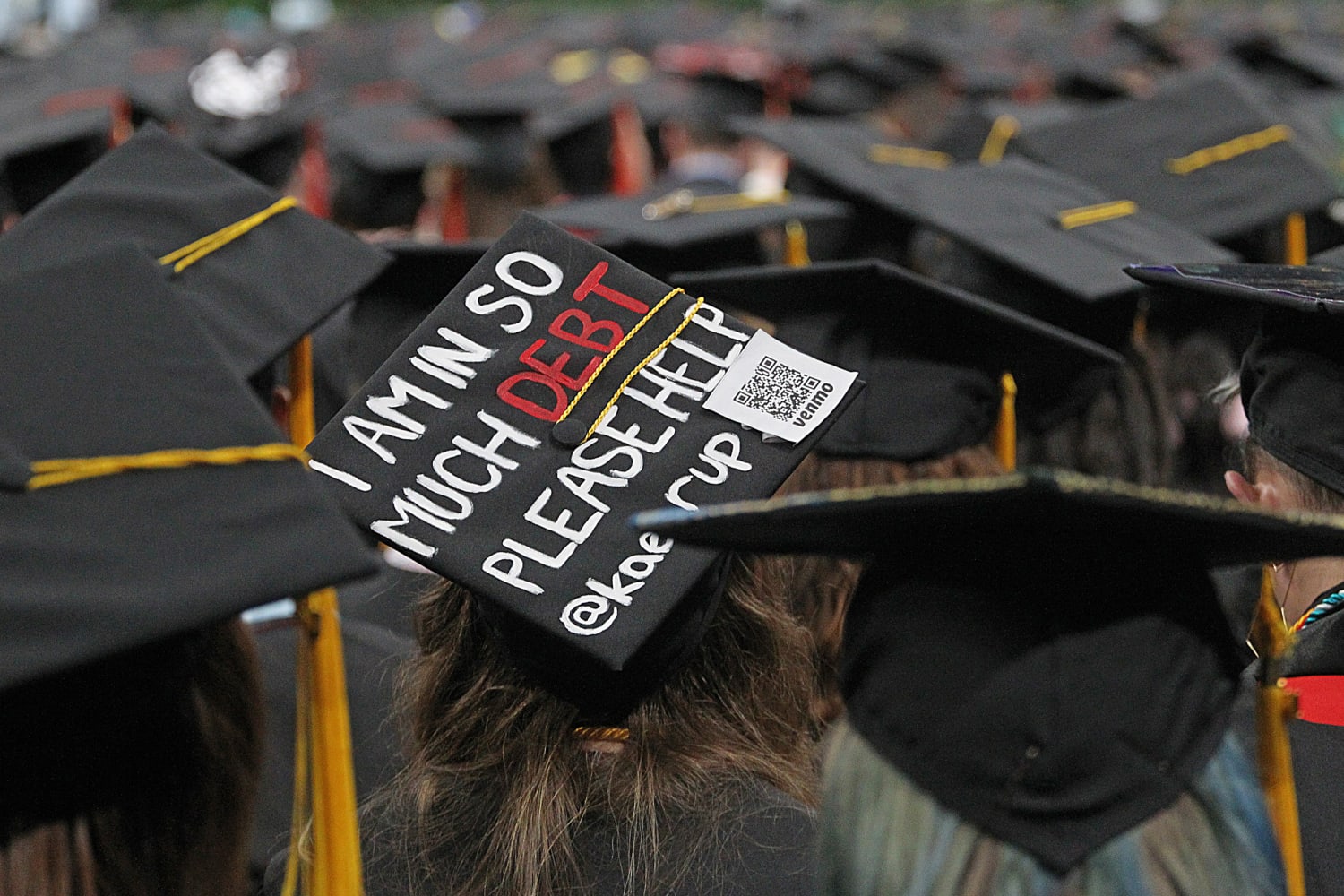
Black voters want student loan debt eliminated altogether. And without substantive action, a sizable chunk of Black voters may consider stay home during the next election, according to a new survey.
According to a national poll shared exclusively with NBC News, 67 percent of registered Black voters strongly support eliminating student loan debt. Overall, 84 percent support a full or partial elimination of student loan debt in the poll by the Global Strategy Group for Color of Change, a national civil rights advocacy organization. Fifty-six percent of Black voters have taken on debt to pay for higher education.
The racial disparity in student loan debt remains prevalent for Black people, based on research released in November 2019 by the Federal Reserve Bank of New York. The researchers found that people in Black-majority neighborhoods were more likely to pay for college through borrowing, with 23 percent of Black residents taking out student loans. However, that figure drops to 17 percent among people in Latino-majority neighborhoods and 14 percent in white-majority areas.
“Black voters who were responsible for delivering not only a majority in the Senate, but [also] a Biden-Harris administration … overwhelmingly want to see sweeping reform in terms of student loan elimination,” said Arisha Hatch, vice president and chief of campaigns at Color Of Change.
A group of Democratic legislators — including Senate Majority Leader Chuck Schumer, D-N.Y., Sen. Elizabeth Warren, D-Mass., and Reps. Ayanna Pressley, D-Mass., Alma Adams, D-N.C., Mondaire Jones, D-N.Y., and Ilhan Omar, D-Minn. — have proposed canceling $50,000 in student loan debt without any tax liability for borrowers.
During a Feb. 4 press conference, Pressley said a nonbinding resolution on the matter currently has 50 co-sponsors in the House and broad support from hundreds of political organizations. According to a press release issued the same day by Warren, at least 14 senators have joined the resolution.
Warren said the move would be the “single most effective economic stimulus that is available through executive action, help narrow the racial wealth gap,” and lift a burden that’s become even heavier for tens of millions of families because of the pandemic.
In response, White House press secretary Jen Psaki reiterated that President Joe Biden “continues to support canceling $10,000 of federal student loan debt per person as a response to the Covid crisis,” and that any action must come from Congress, although he has considered partial student loan cancellation through executive action.
Meanwhile, 40 percent of the 900 nationwide registered voters polled between Jan. 6-10 said they were unwilling to vote for candidates who oppose eliminating student loan debt.
“I feel like someone who would disagree with me on this, and still would want my vote, is fundamentally not standing with me in this fight for racial justice,” said Hadiyah Daché, 34, who runs a small skincare business in Oakland, California. The alumnus of Clark-Atlanta University, a historically Black institution, currently holds more than more than $32,000 in student loan debt, and struggled to find jobs that paid adequately when she graduated at the height of the Great Recession.
“Even with the scraps we’re getting, we are still able to persevere. But this is the one thing holding a lot of us back from really moving forward financially,” Daché said. She noted that student loans have made it more difficult for Black people to get their families out of poverty or invest in the betterment of their communities. According to a 2018 analysis from the Roosevelt Institute, a progressive think tank, households headed by white adults between ages 25 and 40 have 12 times as much wealth as their Black peers. Eliminating student debt, their report says, would narrow the gap by more than half of the current rate.
Black voters hold higher education in higher esteem than the public at large, according to the survey’s findings, “given the perception that it is a ladder to socioeconomic success and that Black families and households are less likely to inherit wealth.” But the impressions largely haven’t aligned with the outcomes for Black people, who have been exploited or shut out of many economic programs and opportunities due to the persistent impact of slavery, the Jim Crow era, redlining, predatory lending and banking discrimination.
Without student loan debt, 73 percent of Black voters polled said they would save for retirement, and about half said they would live in a different neighborhood, or buy a home instead of renting.
Terry Hardaway, 35, closed on his first home last week, a decision he put off for six years. Hardaway, who’s now employed in Columbus, Ohio, as a financial reporting consultant, was paying $350 on average each month for his student loans, and faced complications in the mortgage screening process because of his debt-to-income ratio. To ease the path toward homeownership, he recently arranged a $20,000 payment for the remainder of his nearly $40,000 in total loan debt from both college and a graduate program he hasn’t yet completed.
“I think what needs to be regulated is the price of higher education,” Hardaway said. “When my mother went to college and was able to graduate with only $1,000 in student loans? That’s not really possible now. You can’t take a part time job in the summer to pay for college, whereas that was the norm.”
The affordability issues tied to student loan debt compounds for Black women, who not only represent one of the most engaged, high-turnout voting groups, but also bear the brunt of the gender pay gap. Estimates have shown that Black women make $0.62 cents on the dollar when compared alongside their white male counterparts. Nearly 9 out of 10 Black women in the poll support at least partial cancellation of student loan debt, with 50 percent supporting total elimination.
Iesha Ison, 32, works in Pensacola, Florida, as an adoption coordinator with a child welfare organization. After obtaining her master’s in education from Jackson State University, her debt burden ballooned to more than $160,000. Combined with high rent prices in her area, loan repayment bills force her to live paycheck to paycheck while raising a family.
“I have co-workers who are struggling with student loan debt, because in the field we work in, you don’t make enough to pay what [student loan lenders] are asking,” Ison said. “Student loan debt is what really stood out to me during this election, because it has got in the way of the American dream.” She added that canceling $50,000 would be a “drop in the bucket” for her.
Temeeka Glass, 27, said her parents were willing to take out the vast majority of loans for her tuition at Columbia College Chicago. Although she’s nearly halfway through repaying her portion, Glass said the bills have affected her financial decisions.
“There was a period of time where I sent paperwork to stop payments for six months, so that when I finally got my own apartment, I had to open up a credit card so that I could hire a moving company” and afford other related expenses, said Glass, who supports eradicating student loans. “I’m always just like, ‘Oh, if I spend this much money, what if something happens and I can’t pay my loan next month?’”
Overall, the survey results also show that Black voters consider student loan debt elimination as part of an array of policies that address systemic racism and economic inequalities. Among many proposals mentioned to the respondents, more than half of Black voters said they would never vote for candidates who oppose raising the minimum wage for $15 an hour, and ending mass incarceration for low-level, nonviolent drug offenses. In addition, 49 percent expressed an identical view for candidates who don’t support expanding Medicare to all citizens.
“The elimination of student loan debt is incredibly related to the eradication of racial wealth disparities,“ Hatch said. “It is impossible to talk about an economic justice agenda that doesn’t include a conversation about how Black people in this country are indebted in ways that require them to not realize their dreams, or to stay in discriminatory workplace situations.”
Follow NBCBLK on Facebook, Twitter and Instagram.
Source: | This article originally belongs to Nbcnews.com










